Why Gaelic football's rule changes may not all be a Special Congress fait accompli

There are those in the GAA leadership who are uneasy about the hoopla the presence of presidential candidate Jim Gavin could cause at this Saturday at Special Congress. Pic: Piaras Ó Mídheach/Sportsfile
Judging by the general bonhomie around Gaelic football’s imminent rule changes, it would appear this latest Special Congress in Croke Park will be a seamless affair.
The powers-that-be may be thinking that way too. The clár of the day has debate scheduled to commence at 10.40am and conclude before lunch at 1pm. That is in spite of a hefty list of 62 motions.














